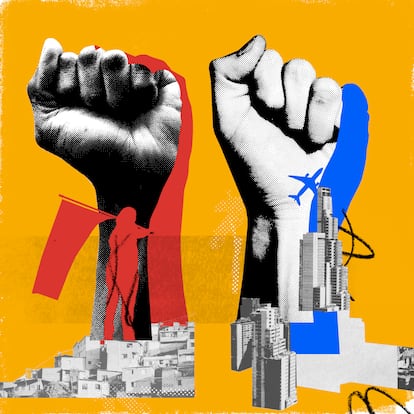
The old left, which has its raison d’être in anti-imperialism, tends to forget that the last time the United States invaded a Latin American country it was to restore the legitimately elected leftist government of Bertrand Aristide to power in Haiti, not to overthrow him.
It was Operation Defend Democracy, launched in September 1994 under President Clinton’s administration. The Marines, after deposing General Raoul Cedras, the de facto ruler, banished him to Panama. And the military intervention took place with the participation of Argentina under the government of Carlos Menem, a Peronist president.
There have been no more imperialist invasions since then, and so far in the twenty-first century, the events have rather had a different sign, beginning with President Obama’s policy towards Cuba, which led in July 2015 to the reestablishment of relations diplomatic relations between the two countries, the loosening of the embargo, the resumption of commercial flights, and the arrival in Cuba of large hotel and communications companies, all of which culminated in Obama’s own visit to Havana in March 2016, the first by a US president since Calvin Coolidge in 1928.
Much of this opening was reversed by Donald Trump, it is true, and the trade embargo was never fully lifted. And it is clear that until the last part of the twentieth century, the behavior of the United States was based on the philosophy of the cold war, with unconditional protection for the operetta dictators in the Caribbean, the identification between banana enclaves and state policies military interventions in the Dominican Republic, Honduras, Nicaragua, Panama, and Haiti itself, in the first half of the twentieth century; the sponsorship of military coups in the southern cone, such as the one orchestrated against Salvador Allende in Chile in 1973, and Reagan’s support of the contras in Nicaragua in the 1980s.
Today, in economic terms, the old imperial backyard is not what it was back then. Despite hegemonic rivalries, the United States is unable to prevent China’s growing economic expansion in Latin America, something that in the classic times of the Dulles brothers would never have been tolerable against Russia: trade with China it has gone from 200 million dollars in 1976, to 450,000 million in 2021, and is the second economic partner in the region, after the United States itself. And Chinese investments already reach 50,000 million dollars.
And there are no signs of any United States policy to prevent more Latin American countries from joining the Belt and Road initiative, the global articulation of the Silk Road, as Argentina has done recently, under the Administration of President Alberto Fernandez.
On the contrary, anti-imperialist governments continue to depend entirely on the United States in economic terms, as is the case of Nicaragua. Despite Ortega’s fiery rhetoric, almost all of the country’s exportable production goes to North American markets within the Free Trade Agreement negotiated by the previous government of Enrique Bolaños; The bulk of imports come from there, and Ortega’s sources of external resources are the financial agencies of the much-maligned empire, the World Bank, the IDB and the IMF.
And as for the isolation initiatives against Russia as a result of the war in Ukraine, in Latin America the United States has not been able to align, as would have been unthinkable in the past, the countries with the greatest political and economic weight, such as Mexico, Brazil or Argentina.
I recount all these events because the Latin American left, which lives inside the sarcophagus of the cold war, is guided by the infallible compass that if the United States opposes a tyrant, it is because that tyrant is anti-imperialist, and we must run to support him in a militant manner, or to align himself with the flagrant human rights violations he commits.
If a regime like Ortega’s in Nicaragua, or Maduro’s in Venezuela, or Raúl Castro’s in Cuba, represses, imprisons, exiles, or puts down protest demonstrations with bullets, it does so because it defends itself from a potential imperial aggression. , or those who rebel against dictatorships act as agents of an imperialist conspiracy.
On this same level, the attack on Ukraine by the Russian army is not a war of aggression, but a defensive measure to prevent imperialism from suffocating Russia by encircling its borders, which leads to defending Putin as a forward in the anti-imperialist crusade. , and, therefore, a saint on the left to pray to; not the enlightened one who wants to return his majesty to the old Orthodox Russia of the tsars, from a vision of reconquering the imperial right, but the champion who seeks to resurrect the longed-for Soviet homeland.
The shell of that Jurassic left has obsolescence, insurmountable prejudices, and ideological beliefs that become religious, dogmas that cannot even be touched because it is anathema. And freezing in time.
But there is something even more essential, buried under it is vicious nostalgia. With the fall of the Berlin wall, when the Soviet Union also disappeared as a pole of the cold war, the foundations of the old orthodox socialist thought also sank: the party as the rector of society, and therefore of the unique thought; and the role of the state as owner of the means of production, and therefore, owner of the economy. Soviet socialism, which in Latin America only came to exist in Cuba as a system of power, went from utopian to dystopian.
The armed struggle as a way of taking revolutionary power to make real socialism real, ended in Latin America at the same time that the Soviet pole collapsed, with the signing of the peace accords in Central America; and only the Colombian guerrilla will survive until the twenty-first century, as an obsolescence, also destined to die.
And when history repeats itself with twenty-first century socialism in Venezuela, with Chávez, and with the return of Sandinismo to power in Nicaragua, with Ortega, it does so as the tragic expression of a failed experience, in the form of leftist dictatorships that differ little from the right-wing dictatorships, so traditional in Latin America. What changes is the rhetoric.
The old orthodox socialism, as an idea, and the new socialism of the twenty-first century, as a project of power, have to live with the reality that the state economy cannot challenge the market economy, which slips through every crack in the reality, and that nationalizations and confiscations do not contribute to distributing wealth, but rather to stagnating and ruining economies.
And the market economy is the Siamese sister of liberal democracy, which social democracy had accepted long ago, with all its inviolable rules of alternation in government, separation of powers, civil liberties and tolerance. For the old orthodox left, social democracy was, and still is, a dirty word, the third column of imperialism. And, thus, obsolescence continues to return for its rights.
A left cornered in the ghostly ideology of the single party, of the economy under state control, and of enmity with democracy, and shielded in the old anti-imperialist pretext to justify dictatorial regimes, has no political viability, although sometimes it can rehearse demagogic speeches elections to get into the game of power. But it does not lay down the rules of the game.
And there is something even deeper that Gabriel Boric’s victory in Chile has taught, and that is that the left, if it deserves that name, has to be democratic, it has to be ethical, and it has to be humanist. They are its marks of authenticity, modernity, and viability.
A left that despises freedom, and justifies oppression, loses all humanistic sense. A left that seeks indefinite permanence in power, even based on electoral tricks, and based on repression, loses all ethical sense.
But a left that from its cenacles justifies dictatorships is a right-wing left. And from the totalitarian right.
Subscribe here to newsletter of EL PAÍS America and receive all the informative keys of the current affairs of the region
Exclusive content for subscribers
read without limits




